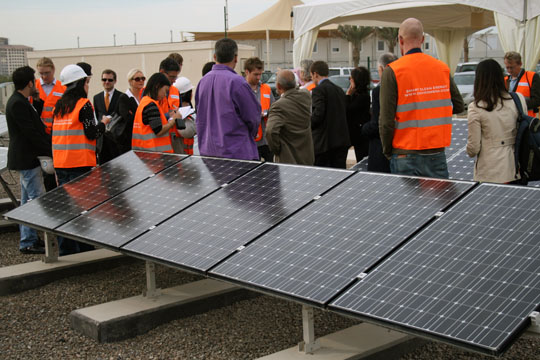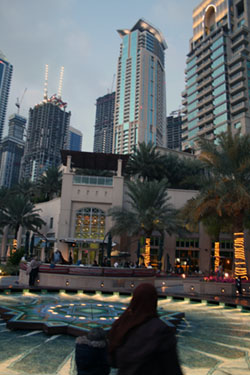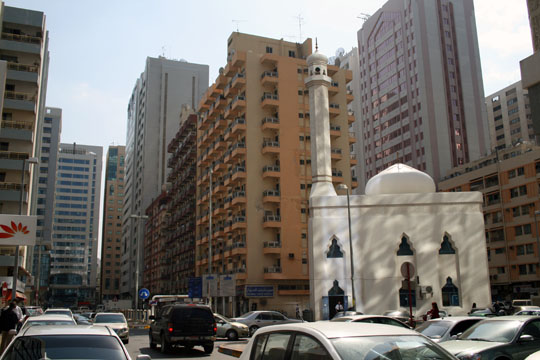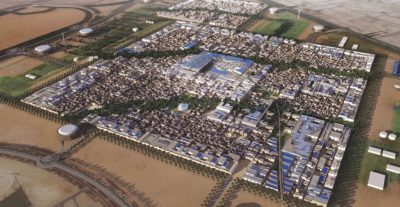Last month, I had the unexpected pleasure of visiting Abu Dhabi and Dubai, two of the seven tiny kingdoms that together make up the United Arab Emirates. I was there to cover the World Future Energy Summit, an international conference on renewable energy technologies.
This was my first visit to the Emirates, which have a reputation for being a nation of oil-drenched spendthrifts, building surreal fantasy projects unlike anything seen in the West and having a larger ecological footprint per capita than even the US and China. However, I knew that Abu Dhabi was also building Masdar City, an attempt to design a “carbon-neutral” city, while building a new sector of the economy from scratch based on renewable energies.
Building new industries from scratch is nothing new in the UAE – thirty or so years ago there was absolutely nothing there, and now the place is a regional economic powerhouse. But an oil state using its wealth to plan ahead for the post-petroleum world – there was a novel idea.
Below are some impressions from my visit to a land described by one colleague as “the greenest gas guzzler.”
Abu Dhabi is the political capital of the United Arab Emirates, and also the richest of the Emirates. About a million people live in the city of Abu Dhabi, on an island roughly the size of Tel Aviv. The rest of the emirate is harsh desert, of little interest to anyone were it not for the enormous deposits of petroleum stored underground.
A few decades ago, there was very little going on there. Today, Abu Dhabi sports all the trappings of a modern city: sparkling skyscrapers, wide boulevards, manicured promenades and well-watered parks (the abundant water, I was told, comes from desalination). There are all kinds of plans to bring branches of foreign museums and universities to town, as well as attractions such as a Formula One racetrack.
Most of the people who live in Abu Dhabi come from somewhere else; the locals are the minority. Hordes of foreign workers, mostly from South Asia, man the construction and service industries. Young professionals from the Middle East, Europe and North America work there as well, attracted by good salaries, no taxes and a sense of opportunity and appreciation for young talent.
Black Gold
Who hasn’t heard the familiar refrain, “Ah, if only we had oil…” It’s one of those standard axioms in this part of the Middle East – life would be better, if only we had found all that oil, instead of those sheikhs in the Gulf. Last month, I heard a similar line from a Jordanian taxi driver.
Well, now I know the truth: it is indeed good to be a Gulf oil state. Abu Dhabi has just under a tenth the world’s proven oil reserves, and unlike many other oil producing states, their oil fields may continue to produce until the end of the current century.
Oil wealth has its benefits. The local “emiratis” live in huge houses, drive around in shiny SUV’s with tinted windows and sport all sorts of fancy jewelry and the latest electronic accessories. Despite their wealth, however, they are an extremely conservative and traditional people. There are no drugs, drinking is allowed only in hotel bars and the laws governing society are strict. Local women are, for the most part, covered head to toe in flowing black robes, while the men wear traditional white robes and head coverings.
A Green Silicon Valley?
However, Abu Dhabi is not content with being just another OPEC member, and is attempting, at the initiative of the sheikhs who rule the emirate, to reposition itself as a global leader in renewable technologies. In 2006, the Masdar Initiative, a government-owned corporation, was founded with a mandate to create a new domestic renewable energy industry. Through Masdar, the government hopes to leverage its experience at the forefront of the nonrenewable energy industry into a future based on a renewable economy. The annual World Future Energy Summit, founded in 2008, was intended to emphasize to the world Abu Dhabi’s position as a leader in this nascent field.
 Members of the press tour a solar panel testing site in Masdar City. A variety of systems are being tried out in local conditions. The best performing panels will be installed on Masdar City’s rooftops.
Members of the press tour a solar panel testing site in Masdar City. A variety of systems are being tried out in local conditions. The best performing panels will be installed on Masdar City’s rooftops.
During the conference this January, which brought together many of the players in the field of renewable energy technologies, the Masdar Initiative announced a slew of new sustainability projects, including a plan to develop renewable energy in Seychelles and a deal with a Spanish engineering firm to build a solar power plant in Spain.
Abu Dhabi also officially announced its goal of producing 7% of its energy from renewable sources by 2020. For the emirate’s leaders, renewable energy is an exciting market, and investing in a domestic renewable energy industry makes good business sense.
However, Abu Dhabi is not stopping there. They are also building a futuristic ecological city, Masdar City – probably the world’s most serious attempt yet at green urban design. Designed by Foster + Partners and built by CH2M Hill, Masdar City will be a 6.5 square kilometer, carbon-neutral walled city. Energy use will be way lower than normal cities, shading and wind will be used for cooling (as well as solar-powered air conditioners for the interiors of buildings) and solar panels will sparkle on every roof. Not a single car will travel through the city; instead a light rail and “Personal Rapid Transit” cars will move people around.
All of this is already being built – I visited the building site. Masdar City is supposed to house the pioneering companies and research institutes that will position Abu Dhabi as a global leader in the field.
In addition to all that, Abu Dhabi is investing in “concentrated solar power” technology, factories to produce photovoltaic panels, wind power generation, experimental hydrogen power technologies, and the list goes on. The underlying goal is to move beyond a fossil fuel economy in order to lead the way to the energy economy of the future.
(So imagine my shock when I learned from Abu Dhabi that Israel had apparently struck enough natural gas to last the country for 20 years, off the coast of Haifa! I was not able to read up on the discovery more extensively in the news, since access to Hebrew websites is blocked here. It is still the Middle East, after all.)
An open question is to what extent all of these green initiatives will actually make Abu Dhabi a more sustainable place. Masdar City is one of the most innovative city-building schemes in the world right now, and when it’s built it will surely raise the bar for cities everywhere. But Abu Dhabi, along with the other cities of the Gulf, was designed for cars (every building in downtown Abu Dhabi fronts onto a huge parking lot; in Dubai it’s impossible to get around without a car). The bulk of the economy continues to be based on oil, natural gas and real estate, although there are attempts to develop a green building code and better long-term city planning.
Dubai – Commercial Paradise or Fleeting Mirage?

Dubai, about an hour’s drive north of Abu Dhabi, is in many ways its total opposite. Whereas change in Abu Dhabi is measured, conservative, forward-thinking, Dubai is flamboyant, frenetic and transitory. In the 24 hours that I spent in Dubai, I managed to see the world’s tallest building (162 floors), the indoor ski slope (it’s in a mall), and the palm islands (artificially built and rumored to be sinking already).
Most of the people that I met at the conference in Abu Dhabi actually live and work in Dubai. It’s a fun, flashy place, where for years people have worked hard and played hard, living well beyond their means. Very little thought has ever been devoted to sustainability in Dubai, whether it be ecological, social or economic.
Lately, the whole house of cards seems to be collapsing, with foreigners (who make up something like 90% of the population) losing their jobs and leaving the country, mega-projects grinding to a halt, and ecosystems already showing signs of serious disruption due to the intense development. Many times larger than Abu Dhabi, Dubai’s entire 60km of coastline (about the same length as the stretch of coast between Netanya and Ashdod) is urbanized.
So keep an eye on this part of the Middle East. While Dubai’s star may already be fading, Abu Dhabi is thinking way ahead, and working hard to position itself as a major player in the coming green economy.






This was a very interesting post. Not only did I enjoy the photos, I liked the accompanying story. I do like the idea of “black gold = green future”… I think this is what the American politicians have to witness–how others around the world are thriving and see them as set examples. I don’t necessarily mean the US should start digging oil since where in the world would they find that anyway, but in such a way that they should utilize whatever they have and turn it into good, safe and working ideas. What does the US have a lot of, and how can it work to their economic advantage? For example, a lot of gas guzzlers and other old cars… Why not promote the programs that trade those old cars for cash or newer, greener models, or to convert the engines with greener ones… I’m pretty sure if the entire country does that, not only will jobs be created, but the environment will be much cleaner and money will flow.